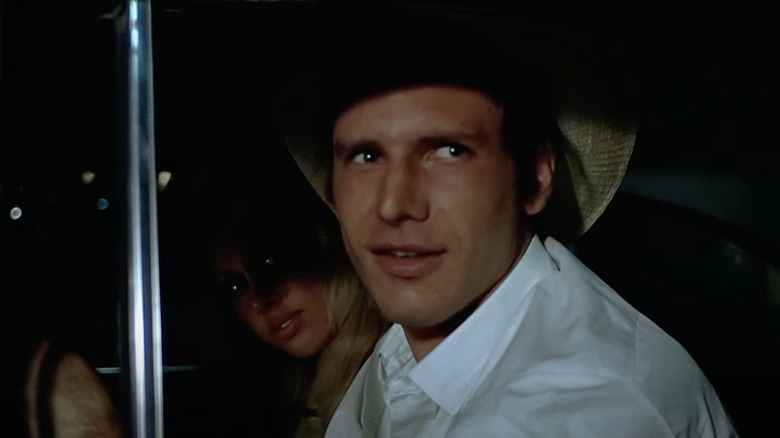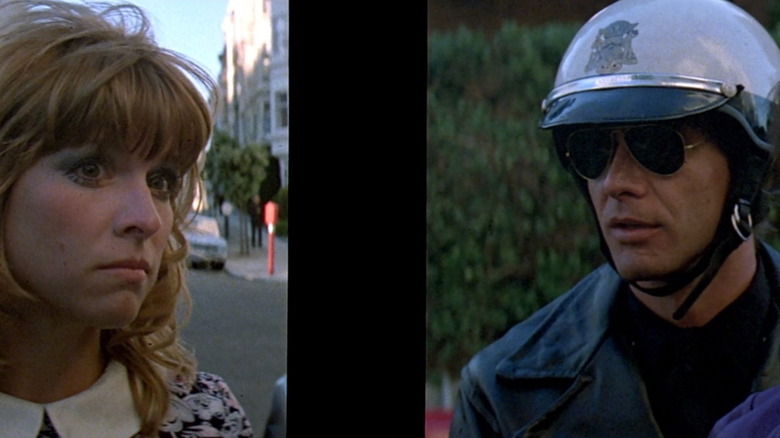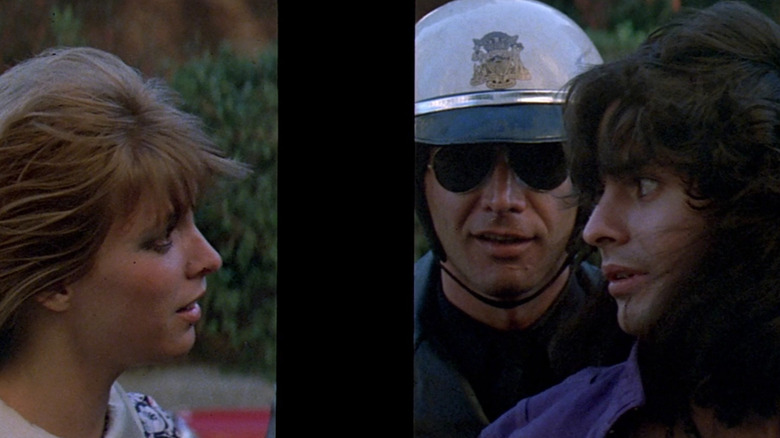An Uncredited Cameo In More American Graffiti Was The Perfect Chance For Harrison Ford Hijinks
Four years before he showed up as Han Solo in the original "Star Wars" movie, Harrison Ford had what Universal Pictures calls his "breakout role" with "American Graffiti" in 1973. Written and directed by George Lucas, "American Graffiti" saw Ford play a character named Bob Falfa who is out to make a name for himself as the fastest street racer in Modesto, California in the early 1960s. The sight of Ford in a white collared shirt and cowboy hat talking trash out of the driver's-side window of his "field car" has become a well-known movie image.
Less famous is the cameo Ford made in the 1979 sequel, "More American Graffiti." In the mid-to-late 1970s, before he reprised his role as Han Solo in "The Empire Strikes Back" and starred as Indiana Jones in "Raiders of the Lost Ark," Ford was still appearing in smaller parts in films like Francis Ford Coppola's "The Conversation" and "Apocalypse Now." "Star Wars" catapulted the carpenter-turned-actor to a new level of fame, making him a household name whose face would be easily recognized.
Lucas was only nominally involved in "More American Graffiti" as an executive producer, but he did help round up as many returning cast members from the first film as he could. This included Ford, who — according to the book "Harrison Ford: The Films" by Brad Duke — reluctantly agreed to do a single day of shooting for "More American Graffiti" as a favor of sorts, since Lucas had helped turn his career around in such a big way with "Star Wars." Ford wanted his cameo to remain uncredited, though, and some viewers might not have even spotted him under the helmet and shades of a motorcycle cop.
'The name is Falfa'
"More American Graffiti" makes use of split-screen and multiple storylines as it catches up with "American Graffiti" characters on New Year's Eves over four consecutive years from 1964 to 1967. Ford's motorcycle cop shows up right around the 10-minute mark as Candy Clark's character, Debbie Dunham, and her new hippie boyfriend, Lance (John Lansing), drive around San Francisco in a car full of drugs.
Ford's cop tries to pull them over and they stall for time as they dispose of the drugs, but unfortunately, Lance forgets about "one lousy joint," a marijuana cigarette, that he has tucked in over his ear. This leads Ford's cop to cuff him, giving Debbie his badge number and even spelling out his name as he does so. "The name is Falfa," he says. "Officer Falfa. F-A-L-F-A."
The joke, of course, is that Falfa, the street racer from the first movie, has now become a traffic cop who's "got nothing better to do than hassle longhairs." Ford, too, would play a few jokes on people after he got in full character and costume as a policeman for "More American Graffiti."
'You get that uniform on and something happens to you'
In "Harrison Ford: The Films," Ford recalled what it was like shooting his "More American Graffiti" cameo, saying:
"I was in full regalia. I mean with the helmet and the Harley [motorcycle], you know? All day long, people would come up to me, taking me for a policeman, 'Scuse me, Officer — how do you find a taxi around here?' 'Well, sir,' I'd say, 'you put your hand up in the air and then you yell "Taxi!" It's like that' One lady asked me nervously, 'Is it all right if I turn here?' I waved my arm and bowed, 'Lady, the city is yours.' I tell you, you get that uniform on and something happens to you."
Impersonating a police officer could get a person in trouble in real life, but Ford was a movie star by this point, so it's doubtful anyone would want to arrest Han Solo while he was shooting a scene for another movie. Offscreen, in interviews, Ford has cultivated something of a gruff persona over the years, but donning the costume of Officer Falfa in "More American Graffiti" allowed him to have a little fun and show off his comedic chops with the deadpan delivery of certain lines.
At one point, amid Debbie and Lance's back-and-forth across the split screen, Ford actually looks right at the camera through his sunglasses, as if breaking the fourth wall but showing that he can be a good sport about the whole thing. While the reception to "More American Graffiti" was much less favorable than the one its Oscar-nominated predecessor received, Ford's scene in it remains an unexpected but funny little footnote in his career.


